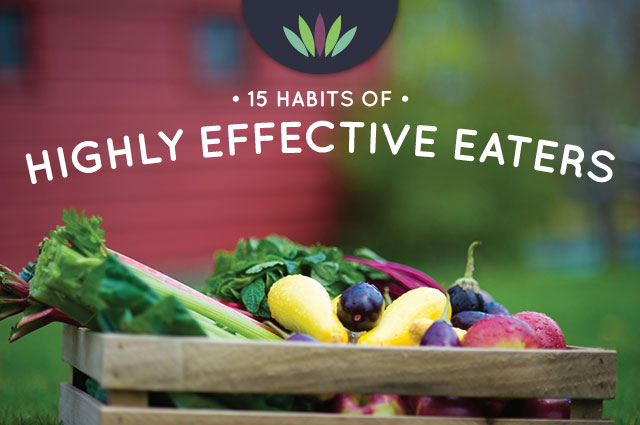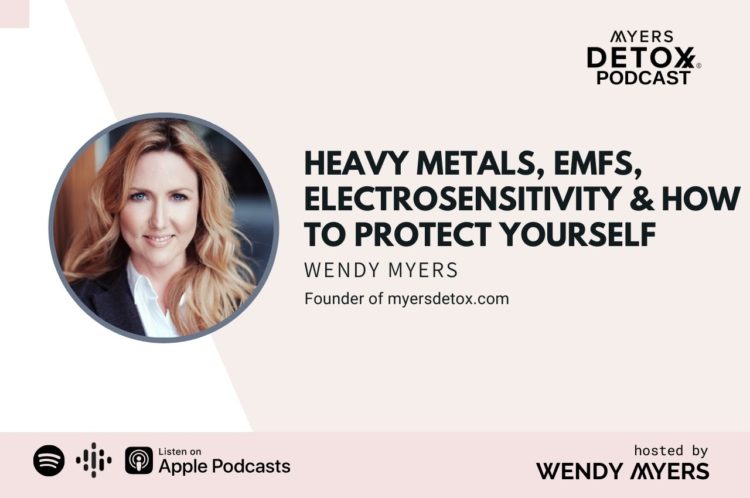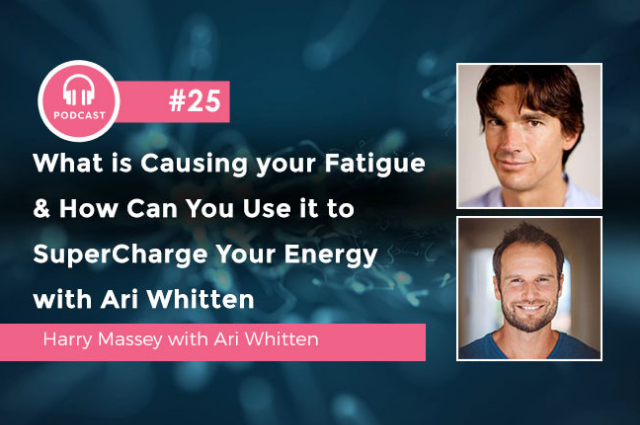15 Habits of Highly Effective Eaters

Trim and fit people are successful, not because of good luck, but because they have adopted effective eating habits. They do things differently than the rest. To be a highly effective eater, you must adopt the habits of success. Stephen Covey’s theories on learning from the habits of successful people in his book The Seven Habits of Highly Effective People suggest that by emulating the habits of successful people, anyone can enjoy the life he or she desires. Learn these 15 habits, adopt the habits, practice the habits and enjoy optimal health and successful weight loss.
1. Drink Water
Hunger is often confused with dehydration. Next time you feel like a snack, have a glass of water. Even mild dehydration can alter our body’s metabolism, so aim to drink 3 liters/quarts a day and limit soda, caffeine and alcohol. It is also agreed that drinking water before meals can help promote weight loss. One study found that participants who drank 2 glasses of water before each meal felt fuller and ate less. You must drink spring water, preferably in glass bottles. Filtered or drinking water is second best – you don’t know if toxins are being filtered from the water. Reverse osmosis water is effectively filtered but doesn’t hydrate as well as spring water. Great filters can be found on Environmental Working Group and APS Water. Tap water is contaminated by 500 chemicals, including medications, parasites, industrial chemicals, heavy metals, pesticides, etc. It’s nasty stuff. Remember that all bottled sodas, teas, and beer are made with this toxic tap water. For more information, read my blog posts What Kind of Water Should I Drink? and Dehydration Causes Pain and Disease.
2. Eat Carbs: Real Carbs!
Replace refined carbohydrates like white bread, pasta, bagels, cereal and pretzels with complex carbohydrates from fruits, vegetables, whole grains, nuts, seeds and legumes. Fruits and vegetables are high in fiber, which slows digestion and promotes stable blood sugar levels. However, you can’t go too crazy with fruit — limit to one or two servings a day — as it has a lot of sugar. Stick to low sugar fruits like melons, grapefruit, lemons, limes, and berries. Whole grain carbohydrates should always be chosen over refined varieties. Think about eating them as you would find them in nature – breads are made from wheat that’s milled, while brown rice is simply taken straight from the plant, complete with fiber and phytonutrients the way Mother Nature intended them be eaten!
3. Choose Healthy Fats
A common misconception is that fats should be completely eliminated. That is so 90’s. In reality, we could not live without fat. The body utilizes dietary fat for energy, health of hair, skin and nails, and vitamin absorption. Every cell in your body uses fat, including your brain, which is 60% fat. Good fats promote health benefits such as protection against heart disease, cancer, Alzheimer’s, and depression, as well as reduced blood pressure and lower cholesterol. Choose sources such as nuts, seeds, fish, fish oil supplements, avocados, organic grass fed meats, bone broths, raw full-fat dairy, raw organic butter, organic eggs, extra virgin olive oil, and coconut oil. You’re likely due for an oil change. You must cut back on unhealthy fats to lose weight. Unhealthy fats cause inflammation that is the underlying cause of obesity and disease. These bad fats include vegetable oils (olive oil is ok), trans fats (in all fast food), partially hydrogenated oils, fried foods, margarine, vegetable oil in processed foods, etc.
4. Eat Lean Protein
Our bodies require protein to continuously renew and replenish our cells, stabilize our blood sugar, and give us energy. Our bodies are literally made out of the amino acids that make up protein in our food. Many foods contain protein, but the richest sources include animal products like meat, dairy, eggs and fish, as well as plant sources like beans, nuts and seeds. When choosing animal protein sources, be conscious of the way the animal was raised and what it ate. Grass-fed beef and free-range chicken are healthier and more ethically sound choices than feedlot meats found in most restaurants and fast food.
5. Eat Breakfast
Eating a healthy breakfast reduces hunger throughout the rest of the day, therefore decreasing the likelihood of overeating and making poor food choices at lunch. By eating a hearty breakfast, you’ll give your metabolism a jumpstart and be in better control of your cravings. When we miss our first fuel of the day, by mid-morning we are hungry and more likely to engage in mindless nibbling, snacking, over eating and compensating for any calories ‘saved’ by skipping breakfast. Studies repeatedly show daily breakfast consumption is associated with maintaining a healthy weight. This is due to fact that overweight people tend to skip breakfast and skew their calorie consumption towards the end of the day. But if you’re not ready for breakfast early in the morning, listen to your body and eat when you feel it’s best for you. Many mornings I’m not hungry but try to eat a little breakfast.
6. Eat Structured Meals
It’s important to balance your food intake throughout the day by eating structured meals to help maintain normal blood sugar and decrease the chances of bingeing when hunger strikes. Goal: Eat just enough food to get you to the next meal. Feeding your body on a regular basis lets it know food is available and it’s okay to burn energy rather than conserve and store it as fat. This is exactly what happens when you starve yourself or skip meals. How many meals you eat a day is dependent upon your body type, diet, and activity level. For most, it is best to eat three structured meals a day with no snacks. Only athletes need three meals a day plus snacks in between. Experiment and do what works for you. Eating three meals a day is something you can easily do for the rest of your life and will ensure compliance and success. Eating six meals a day (as is fashionably recommended for weight loss) may increase your metabolism, but it’s not practical for most people. It should be considered a short-term eating program. Six daily meals put a lot of stress on your digestive system, which needs rest like all the body’s systems. Do what works for the long-term.
7. Exercise
Exercise metabolizes stress hormones (less cortisol = less insulin = fewer fat deposits) and keeps blood sugar even, resulting in fewer binges or snacking. Exercise should be used in moderation, with time for rest in between strenuous workout days. For info on the best and most effective workout in the least time, see the article Peak Fitness Exercise Benefits. It’s nearly impossible to burn off a high calorie diet with exercise. Believe me, I’ve tried it! It takes a lot of time and puts too much strain on the body. The secret to a healthy weight is 60-70% diet. But you still have to workout to maintain your weight loss and be healthy!
8. Sleep 7-9 Hours
Research shows that those who sleep 5 hours or less weigh 5 pounds more on average than those getting at least 7 hours of shut eye per night. Over time, weight increases more rapidly in those who get 5 hours of sleep when compared to those getting 7 hours. Lack of sleep disrupts circadian rhythms and can lead to inefficient body regulation of energy balance, metabolism and appetite. Abnormal leptin and ghrelin levels – hormones that tell your body “I’m full, stop eating” – can go awry with too little sleep and lead to overeating. Said simply – sleep more, eat and weigh less! Strive for 7-9 hours of sleep each night.
9. Learn to Cook
Cooking meals at home allows you to control portion sizes, the quality of ingredients, and cuts your intake of sodium, bad fat and calories. Try to reduce frying foods by learning to roast or bake, and eat more raw foods to cut calories. Use herbs and spices to reduce salt intake. Use colored (unbleached) sea salt as it is more compatible with your body and provides vital minerals. One way to control the quality of foods is to transition away from eating in restaurants as there are only a few if any restaurants in any one area that provide consistently high quality foods. Most, even the most expensive ones, will frequently use pesticide-drenched produce, aluminum cookware, factory farmed fish, poultry, dairy, and other animal products. And most will use cheap refined oils and fluoridated water.
10. Be a Food Detective
Be a food detective and investigate what you choose to put into your body. Check labels and avoid ingredients such as sugar, artificial flavoring or coloring, trans fats (hydrogenated oils), MSG, high-fructose corn syrup or long chemical names that are hard to pronounce. You should only eat foods with five or fewer ingredients on the label. The healthiest foods are those found just as nature intended – whole and unprocessed.
11. Do the 90/10 Diet
This means eating 90% of what you should be eating and 10% of what you should NOT be eating, i.e. sweets, sodas, simple carbs. It’s impossible, except for the most disciplined to eat perfectly all the time. Invariably, you will find yourself in a pinch and make poor eating choices. You can have one cheat meal a week or one or two small desserts a week and still lose weight. I tend to eat good all week and reserve my cheat day for Sunday. Do what works for you. Effective eaters rarely report eliminating foods. If it’s something they crave, they enjoy a little taste. They know that simply eliminating foods they absolutely love will only set them up to fail when the temptation is too great. Instead, effective eaters know that it’s okay to indulge every once in a while. They savor those moments instead of sucking down the food as if they’re afraid it’s the only time they’ll ever see it again.
12. Eat the Right Kind of Calories
Even if you eat 2000 calories or less a day you can still gain weight if the calories are ‘white foods’ like sugar, white rice, white flour pasta, white potatoes, white bread, or too much fruit. You can also gain weight if your diet is too heavy in complex carbohydrates — don’t think you can go crazy with these ‘healthy’ carbs either. These foods cause your blood sugar to spike, which results in insulin secretion. Insulin is the hormone that signals your body to store fat. The more carbohydrates you eat, the more insulin you secrete, the more fat you store. Some people are particularly sensitive to carbohydrates and have to cut them out completely.
13. Listen to your Body
People that are a healthy weight learn to listen to their body and give it what it needs. Listening to your body entails learning to stop eating when you feel full and eating foods that your body is craving (as long as they are healthy). Only your body knows what it needs at every moment. What should drive your food choices are your senses of smell, taste, desire for a particular food and a sense of satisfaction after eating it. So, when your body needs a particular mix of nutrients, it will give you a desire for a particular food, which contains just that right mix. This particular food will smell divine to you and taste wonderful, and you will feel satisfied after eating it. But in an hour or two the needs of your body will change, and that particular food will not be appealing anymore for you; instead, you will have a desire for another food, which nutritionally will serve you correctly for that particular moment of your life. Eat the foods your body is craving, apart from unhealthy foods. Unhealthy cravings (for sweets, carbs, etc) are driven by other factors that are not nutritional needs. Listening takes practice. For more information on this subject, read my blog Eat by Listening to Your Body.
14. Eat Every 4-5 Hours
Eating every 4-5 hours keeps blood sugar even. When we go longer than 4 hours without eating, our levels of the stress hormone cortisol rise. And high cortisol levels signal the body to store fat in the abdominal region. People who skip meals have the highest cortisol levels of all! If your blood sugar drops too much because you wait too long to eat you’re more likely to binge. If you eat too much, your blood sugar will spike, then quickly drop too low, causing you to think you’re hungry and want to eat again too soon. This is the vicious cycle most people experience. Cravings for sweet foods and carbohydrates are common amongst people with unstable blood sugar levels who eat a lot of processed foods and ‘white foods’ (sugar, white rice, white flour pasta, white potatoes, white bread). As long as you eat these foods you will be trapped in blood sugar spikes and dips cycles, causing you to want to eat before mealtime. It takes time to normalize blood sugar. The most effective way to deal with it is to increase your fat consumption, particularly animal fats.
15. Don’t Eat 3-4 Hours Before Bedtime
Anything you eat, even healthy food, a few hours before bedtime causes a surge in insulin and causes you to gain weight. Not eating after dinner induces a fast. I don’t eat from 6pm to 8am the next morning. This gives my body 14 hours to detox, repair, and burn fat. If you eat after dinner, your body will burn that food for energy and never kick into fat-burning mode. Fasting after dinner is vital for your health as well as your waistline because the energy you spend digesting is energy taken away from detox and repair. Ideally, try to get your entire food intake in an 8-10 hour period during the day. The rest of the time you’ll be burning FAT.
Have any more tips for effective eating? Leave a comment below and tell me!









This was your best article to date!
Have you heard of Jen’s list? You should post there.
Hope all is well. Happy New Year!
Caroline Madden, MFT
Individual Therapy and Couples Counseling
(626) 644-1609
http://www.CounselingWithCaroline.com
“The tools you need. The relationship you want.”
5 Tips to Better Conversations with Your Partner